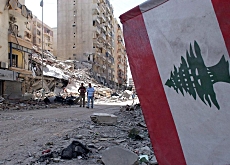More cash needed for Lebanon aid operation

The Swiss foreign ministry has called for more funds to increase humanitarian aid to Lebanon as thousands of displaced people start heading back to their homes.
Officials said they are re-assessing the needs of the Lebanese population and will shift the focus of aid operations following the ceasefire between Israeli forces and Hezbollah militia.
Toni Frisch, head of the Swiss Humanitarian Aid Unit (SHA) said the additional money was intended for relief efforts of United Nations agencies and Swiss aid organisations.
“Possibly up to 10,000 families could benefit from our assistance,” Frisch told public radio on Tuesday.
He said he expected the cabinet to decide later this month, but refused to reveal the exact amount of the aid demand. He added that the focus of Swiss support would shift to help displaced people returning home.
“Tens of thousands of apartments have been destroyed, along with much of the infrastructure,” said Frisch. “People have lost their jobs; factories, stores or restaurants have been bombed, and many [displaced people] have nothing to return to.”
Last month in an emergency cabinet meeting approved SFr5 million ($4 million) for the Geneva-based International Committee of the Red Cross. The Swiss authorities also granted several hundred thousand francs in aid.
An international donor conference is scheduled for August 31 in Sweden. The aim is to provide urgently needed humanitarian aid and the coordination of the relief operations.
Return
Thousands of refugees are trying to return their homes in southern Lebanon from the capital, Beirut, a day after a shaky ceasefire between Israel and Hezbollah militias took effect.
“The Lebanese authorities told us that an estimated 75 per cent of the displaced people in the Chouf mountains [southeast of the capital, Beirut] have returned home,” said Daniel Beyeler, head of the SHA team in Beirut.
The UN also reported a rush of people crossing the border from Syria into Lebanon.
Beyeler told swissinfo that the SHA was reassessing its aid deliveries to the Chouf region, where much of its efforts have been concentrated.
“We’re talking to the local authorities to get a clear picture of the new situation. Until such time we have put on hold our twice-daily transports.”
Last week the Swiss foreign ministry’s aid agency said more than 800 families had received non-food deliveries and that a first camp for 360 refugees had been handed over to the Lebanese authorities.
Meanwhile on Tuesday, group of Lebanese expatriates called on the Swiss government to play a part in rebuilding the country.
“Switzerland is accepted by every party in the conflict and could act as a catalyst,” Malek El-Khoury told a news conference in Bern.
Repair
The UN refugee agency also warned that people who come back to their destroyed villages are not sufficiently aware of unexploded ammunition scattered in the area.
Other villages are without electricity, water and basic services, but Hezbollah said it would begin repairing homes damaged by Israeli air strikes. It pledged to pay a year’s rent and other costs to help the owners of about 15,000 destroyed houses.
Plans for an expanded UN force are still in their early stages. Diplomats said a more detailed concept would be ready later this week.
Under the ceasefire agreement, Israel will withdraw from the areas occupied in the military offensive launched on July 12. Instead Lebanon plans to deploy 15,000 of its troops in the area.
Together with a 15,000-strong UN contingent they control a buffer zone to keep Hezbollah militia away from the Lebanese-Israeli border.
swissinfo with agencies
Since fighting began between Israeli forces and the Hezbollah militia on July 12, Switzerland has given the ICRC SFr5.2 million ($4.3 million) for relief work in Lebanon.
Switzerland has also sent 800 kilograms of medication and seven tons of supplies, along with a dozen humanitarian specialists.
920 Swiss were evacuated from Lebanon.

In compliance with the JTI standards
More: SWI swissinfo.ch certified by the Journalism Trust Initiative










You can find an overview of ongoing debates with our journalists here . Please join us!
If you want to start a conversation about a topic raised in this article or want to report factual errors, email us at english@swissinfo.ch.